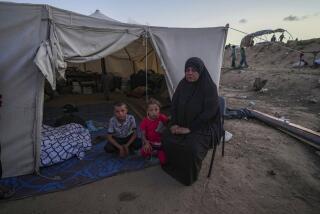Palestinians See Israelis as the Crusaders
- Share via
JERUSALEM — Israel is often accused of suffering from a “Holocaust complex,” which prevents it from taking risks for peace. In recent years, though, a new generation of Israelis has largely put the traumas of the past behind it. The pleasures and burdens of sovereignty have freed most Israelis, outside of the hard right, from the self-pity of victimhood. Unlike the late Prime Minister Menachem Begin, few Israeli politicians even invoke the Holocaust anymore.
Yet as Israelis overcome the psychological blocks of the recent past, the Arab world, and especially the Palestinians, remain caught in a medieval “Crusader complex” motivated by fantasies of vengeance and holy war. In Arab political discourse, Israel is routinely compared to the Crusader state that ruled Jerusalem for just under 100 years. Like that Crusader state, Israel is perceived as a foreign implant in the Middle East that must be gradually constricted and finally expelled.
Saladin, the Muslim hero who defeated the Crusaders, has been a role model for Arab leaders like Saddam Hussein and the late Syrian President Hafez Assad; Palestinian leader Yasser Arafat frequently cites Saladin’s precedent.
In the West Bank city of Nablus, I saw a massive street banner depicting Arafat riding a white steed and clutching a sword, a modern Saladin on his way to Jerusalem.
Though Palestinian spokespeople invoke human rights in appealing for Western sympathy, the internal language of the Palestinian revolt is “holy war”--hardly surprising given the fact that no regime in the Arab world respects democratic values. Last week, for example, at a funeral in the West Bank city of Ramallah for a Palestinian killed in a clash with Israeli soldiers, mourners chanted, “Jews beware, the army of Allah is marching.” Nowhere is Palestinian hypocrisy more blatant than in the cynical manipulation of the memory of several dozen teenagers and children killed in recent anti-Israeli riots. While Palestinians’ main propaganda thrust is to portray Israelis as child-killers, the Palestinian and Arab media laud the dead children as religious martyrs of the campaign to expel the foreign usurper.
In an Oct. 28 interview with an Egyptian weekly, Sheik Ekrima Sabri, the Arafat-appointed mufti of Jerusalem and of Palestine, was asked: “What do you feel when you pray [for the martyrs’ souls]?”
The sheik replied, “I feel the martyr is lucky because the angels usher him to his wedding in heaven.”
“Is it different when the martyr is a child?”
“Yes, it is. . . . The younger the martyr, the greater and the more I respect him.”
“Is this why the mothers cry with joy when they hear about their sons’ death?”
“I talked to a young man [who] said, ‘I want to marry the black-eyed women of heaven.’ The next day he became a martyr. I am sure his mother was filled with joy about his heavenly marriage. Such a son must have such a mother.”
The sheik added that, just like Saladin, Muslims today are fighting to liberate the whole of Palestine “from the [Jordan] River to the [Mediterranean] Sea.” In other words, the source of the Middle East conflict isn’t Israel’s policies but its existence.
There is, of course, another face of Islam. The Sufi mystics, for example, have transmuted the concept of holy war into a believer’s spiritual war against his own imperfections. But the Islam that is being proclaimed in Palestinian mosques and on Palestinian TV is the hatred and incitement of fundamentalist groups like Hamas and Hezbollah, whose flags are carried at anti-Israeli riots, along with Iraqi flags and photographs of Saddam Hussein.
For all its problems, the Arab world acts as if the region’s most pressing crises all relate to Israel--despite the Barak government’s acceptance of the principle of a Palestinian state on almost the entire West Bank and Gaza and of sharing sovereignty over Jerusalem and the Temple Mount.
Emergency Arab and Islamic summits are devoted not to solving the growing poverty and income disparity in Muslim countries but to inciting religious frenzy against the Jewish state.
So long as the Arab world continues to confuse Israel for the Crusader kingdom and a modern national conflict for medieval holy war, peace in the Middle East will remain a futuristic fantasy.
More to Read
Sign up for Essential California
The most important California stories and recommendations in your inbox every morning.
You may occasionally receive promotional content from the Los Angeles Times.












